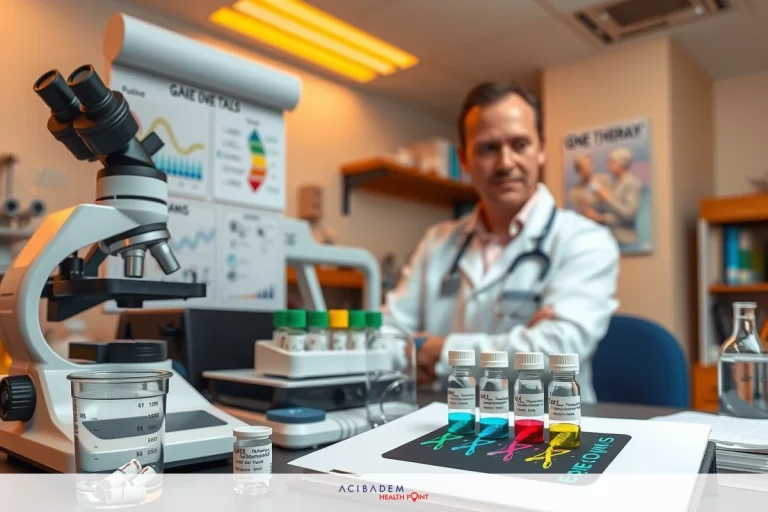Can Monoclonal Antibodies Be Used for Genetic Disorders? Monoclonal antibodies are a new way to treat diseases. They work by targeting specific parts of the body. But can they help with genetic disorders? This question sparks interest among many people.
Genetic disorders happen when there is a change in DNA. This can lead to various health problems. Current treatments include many different methods but they do not always work well for everyone.
Imagine if we had another option that could make things better. Monoclonal antibodies might be this option. Researchers are looking into how these special proteins could target and fix issues caused by genetic changes.
The idea sounds good but it is still early days. Many tests need to be done before we know if monoclonal antibodies can truly help with genetic disorders. The hope is high and so are the stakes involved in such research.
What Are Monoclonal Antibodies?
Monoclonal antibodies are special proteins. They are made in labs. These proteins can attach to specific targets in the body. The immune system uses them to find and fight invaders like viruses. Scientists have found ways to create these antibodies for medical use.
These lab-made proteins work much like natural ones do. They lock onto their targets with precision. This makes them very effective in treatment options for different diseases. For genetic disorders researchers believe they can target faulty genes or cells.
What sets monoclonal antibodies apart is their specificity. Unlike other treatments that might affect many parts of the body they focus on one thing at a time. This reduces side effects and increases effectiveness making them a valuable tool in medical research.
In recent years the role of monoclonal antibodies has grown fast within medicine fields such as cancer therapy. Autoimmune diseases treatment options have shown great success rates by using these targeted therapies which brings hope for treating complex genetic disorders more effectively than ever before possible.
How Do Genetic Disorders Occur?
Genetic disorders happen when there are changes in DNA. These changes are called mutations. They can affect how the body works in many ways. Some mutations are small while others can be large and complex.
DNA is like a set of instructions for our bodies. It tells cells what to do and how to grow. When there’s a mutation these instructions get mixed up. This mix-up can cause problems with growth or function.
There are different ways these mutations occur. Some people inherit them from their parents. Other times they happen randomly during cell division or due to environmental factors like radiation or chemicals.
Medical research aims to understand these mechanisms better each day by studying genetic disorders closely. It helps in developing new treatment options including the use of monoclonal antibodies.
Current Treatments For Genetic Disorders
Treating genetic disorders can be complex. There are many treatment options available today. These treatments aim to manage symptoms and improve quality of life.
One common approach is medication. Some drugs help control symptoms or slow disease progress. For example

enzyme replacement therapy provides missing enzymes to patients with certain genetic diseases.
Another option is gene therapy a newer method that shows promise in medical research fields by aiming to correct faulty genes at their source through various techniques like CRISPR which offers hope but also faces challenges including safety concerns and long-term effects.
In some cases doctors may suggest surgery as part of the treatment plan especially when physical abnormalities need correction which could significantly enhance patient’s daily functioning ability.
Potential Of Monoclonal Antibodies In Treating Genetic Disorders
Monoclonal antibodies are a new and exciting field in medical research. These lab-made proteins can target specific cells or molecules. This makes them a promising treatment option for genetic disorders.
In the case of genetic disorders monoclonal antibodies might help by targeting faulty genes or proteins. They could correct these issues at their source. This is different from other treatments that only manage symptoms.
The precision of monoclonal antibodies is what sets them apart. They focus on one problem area without affecting healthy parts of the body. This reduces side effects and increases effectiveness offering hope to many patients.
Ongoing studies aim to explore this potential further as researchers continue to investigate how best these innovative therapies could be applied specifically towards treating complex genetic conditions. Can Monoclonal Antibodies Be Used for Genetic Disorders?
Consult Your Insurance Company
When considering treatment options it’s vital to consult your insurance company. This step ensures you understand what is covered. Different plans offer different levels of coverage.
Monoclonal antibodies can be expensive. Genetic disorders often require long-term care too. Knowing what your health insurance covers helps in planning finances better.
Contacting your insurance provider early can save time and stress later on. They can provide details about what treatments are included under your plan. Ask specific questions to get clear answers.
Medical research is always advancing so new treatments may become available including innovative therapies like monoclonal antibodies that could potentially offer more effective solutions for genetic conditions.








